
Filter News
Area of Research
- Biology and Environment (26)
- Clean Energy (13)
- Computational Biology (2)
- Computational Engineering (1)
- Computer Science (2)
- Electricity and Smart Grid (1)
- Energy Frontier Research Centers (1)
- Functional Materials for Energy (1)
- Fusion and Fission (3)
- Materials (43)
- Materials for Computing (7)
- National Security (5)
- Neutron Science (11)
- Quantum information Science (1)
- Supercomputing (50)
News Topics
- (-) High-Performance Computing (94)
- (-) Nanotechnology (60)
- 3-D Printing/Advanced Manufacturing (128)
- Advanced Reactors (35)
- Artificial Intelligence (102)
- Big Data (62)
- Bioenergy (92)
- Biology (102)
- Biomedical (62)
- Biotechnology (24)
- Buildings (67)
- Chemical Sciences (74)
- Clean Water (31)
- Climate Change (106)
- Composites (30)
- Computer Science (199)
- Coronavirus (46)
- Critical Materials (29)
- Cybersecurity (35)
- Decarbonization (85)
- Education (5)
- Element Discovery (1)
- Emergency (2)
- Energy Storage (112)
- Environment (201)
- Exascale Computing (44)
- Fossil Energy (6)
- Frontier (46)
- Fusion (59)
- Grid (67)
- Hydropower (11)
- Irradiation (3)
- Isotopes (57)
- ITER (7)
- Machine Learning (51)
- Materials (150)
- Materials Science (149)
- Mathematics (10)
- Mercury (12)
- Microelectronics (4)
- Microscopy (51)
- Molten Salt (9)
- National Security (73)
- Net Zero (14)
- Neutron Science (140)
- Nuclear Energy (111)
- Partnerships (51)
- Physics (64)
- Polymers (33)
- Quantum Computing (39)
- Quantum Science (73)
- Renewable Energy (2)
- Security (26)
- Simulation (53)
- Software (1)
- Space Exploration (25)
- Statistics (3)
- Summit (61)
- Sustainable Energy (130)
- Transformational Challenge Reactor (7)
- Transportation (99)
Media Contacts
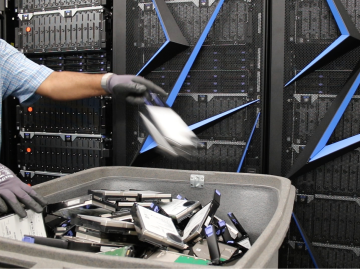
The Summit supercomputer, once the world’s most powerful, is set to be decommissioned by the end of 2024 to make way for the next-generation supercomputer. Over the summer, crews began dismantling Summit’s Alpine storage system, shredding over 40,000 hard drives with the help of ShredPro Secure, a local East Tennessee business. This partnership not only reduced costs and sped up the process but also established a more efficient and secure method for decommissioning large-scale computing systems in the future.
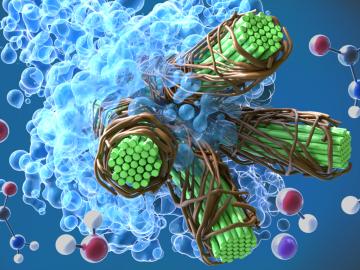
A team led by scientists at ORNL identified and demonstrated a method to process a plant-based material called nanocellulose that reduced energy needs by a whopping 21%, using simulations on the lab’s supercomputers and follow-on analysis.
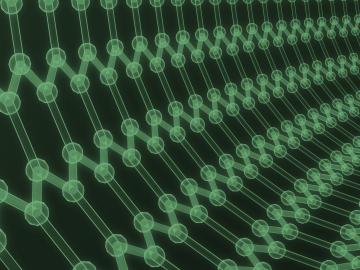
Office of Science to announce a new research and development opportunity led by ORNL to advance technologies and drive new capabilities for future supercomputers. This industry research program worth $23 million, called New Frontiers, will initiate partnerships with multiple companies to accelerate the R&D of critical technologies with renewed emphasis on energy efficiency for the next generation of post-exascale computing in the 2029 and beyond time frame.
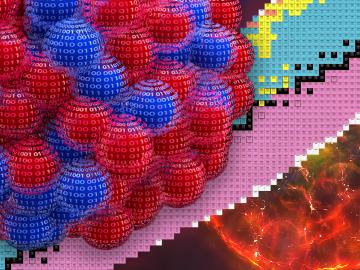
Nuclear physicists at the Department of Energy’s Oak Ridge National Laboratory recently used Frontier, the world’s most powerful supercomputer, to calculate the magnetic properties of calcium-48’s atomic nucleus.
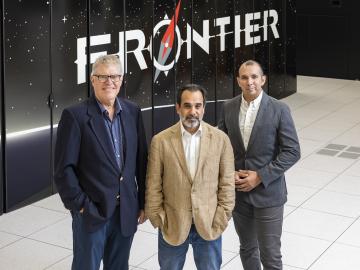
A study by more than a dozen scientists at the Department of Energy’s Oak Ridge National Laboratory examines potential strategies to integrate quantum computing with the world’s most powerful supercomputing systems in the pursuit of science.
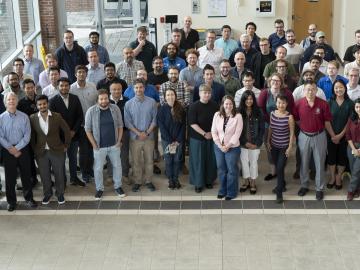
The Quantum Computing User Forum welcomed attendees for a dynamic event at ORNL. The annual user meeting brought the cohort together to highlight results and discuss common practices in the development of applications and software for quantum computing systems.
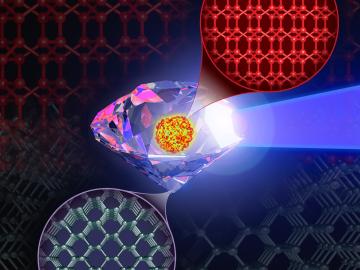
The world’s fastest supercomputer helped researchers simulate synthesizing a material harder and tougher than a diamond — or any other substance on Earth. The study used Frontier to predict the likeliest strategy to synthesize such a material, thought to exist so far only within the interiors of giant exoplanets, or planets beyond our solar system.
The contract will be awarded to develop the newest high-performance computing system at the Oak Ridge Leadership Computing Facility.
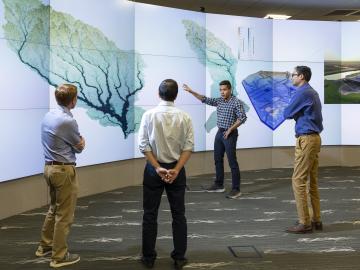
To better predict long-term flooding risk, scientists at the Department of Energy’s Oak Ridge National Laboratory developed a 3D modeling framework that captures the complex dynamics of water as it flows across the landscape. The framework seeks to provide valuable insights into which communities are most vulnerable as the climate changes, and was developed for a project that’s assessing climate risk and mitigation pathways for an urban area along the Southeast Texas coast.
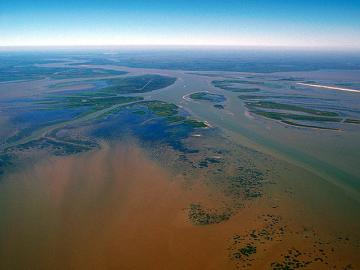
In the wet, muddy places where America’s rivers and lands meet the sea, scientists from the Department of Energy’s Oak Ridge National Laboratory are unearthing clues to better understand how these vital landscapes are evolving under climate change.


